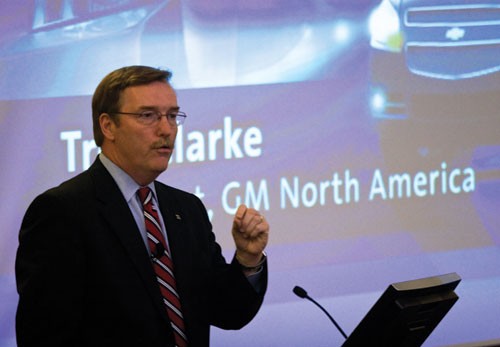
Photo by Casey Lee, The Daily Campus. President of GM North America Troy Clarke speaks to Cox business students and SMU alumni Wednesday in Crum Auditorium about emerging energy technologies.
American automakers have been on the downturn for the last few years. They have been painted as unreliable gas guzzling pick-up truck and SUV producers in a world with rising fuel costs. That’s the perception that Troy Clarke, president of General Motors’ North American operations, spoke about on Wednesday evening in a packed Crum auditorium.
Clarke cited the size of the GM family as having over 266,000 employees world-wide, and manufacturers building automobiles in 35 different countries. GM is one of the largest auto manufacturers in the world and owns household name brands such as Chevy, Saturn, Pontiac, Hummer and Cadillac.
For many years GM has been one of the three dominant U.S. auto producers, but has fallen on hard times of late according to Clarke.
“It always seems that if the economy catches a cold, the auto manufacturers catch pneumonia,” Clarke said. “The market is shifting, and GM like all businesses is adapting to keep up.”
Clarke demonstrated that with rising fuel costs, gasoline up $0.83 year after year, and a fall in both consumer confidence and disposable income, the market has shifted from a heavy demand for trucks and SUV’s to smaller, more fuel efficient cars.
With GM producing nearly 47 percent of the trucks and SUV’s in North America, a change was needed.
Clarke discussed some little known facts about GM’s attempt to stay ahead of the curve. He cited that GM has the most options for fuel-efficient vehicles, listing off the 18 models that get 30 miles per gallon in fuel economy.
In addition, Clarke showed the GM model of the hydrogen fuel cell vehicle, the Equinox. More than 100 of the fuel cell vehicles have been produced and put in the hands of average people to get honest reviews.
Although the fuel cell vehicle is ready for mass production, it will be an unknown number of years until it becomes an actuality, with issues such as hydrogen infrastructure and consumer preference standing in the way.
Clarke also discussed the “bailout” that GM asked the federal government for. Taxpayers could potentially be on the hook for $25 billion to subsidize the mega auto-manufacturer. Clarke showed that this is for a return to the American taxpayer.
“Congress has mandated an industry average of 35 mpg or better by 2020,” Clarke said. “This was the figure that they thought was reasonable and would not bankrupt the car companies, but it just depends on how valuable sooner results in this facet are to the American taxpayer.”
Clarke said that GM may be having its troubles but feels that it will return as a force in the auto industry once again.
“There is no reason why we can’t compete,” Clarke said. “We have an economy that is essentially grinding to a halt with liquidity problems, but that hasn’t stopped us before. There will always be trucks sold, but the days of GM being known as a truck company rather than a car company are quickly coming to a close.”








